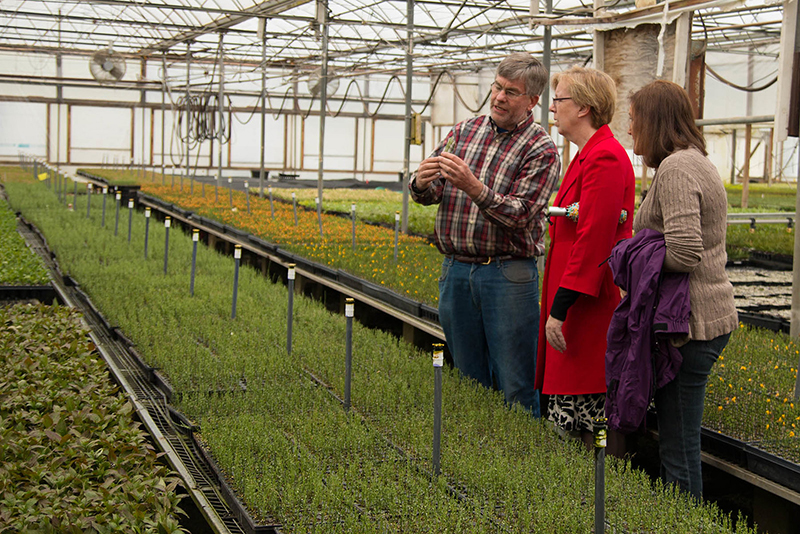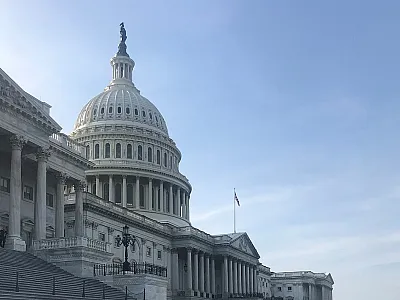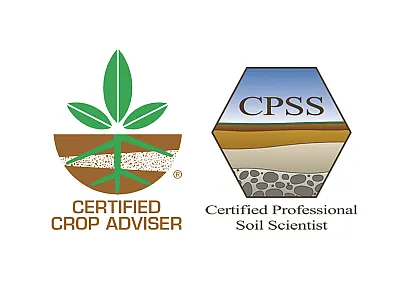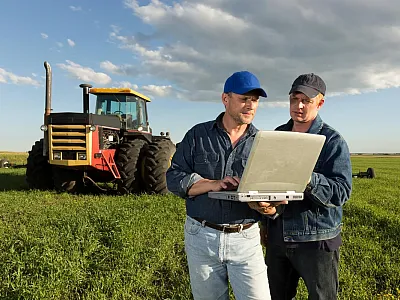August offers an opportunity to advocate for science
Tips and strategies for making your voice heard during the congressional recess

Research institutions in the United States, undeniably, cannot work at their full capacity without funding from the federal government. But recent proposed cuts to federal programs leave some Society members concerned about their ability to run their research programs in the upcoming future. CSA News sat down with Julie McClure, a scientist and agricultural policy expert who works with Torrey Advisory Group and the Societies, to discuss how ASA, CSSA, and SSSA members can advocate for their work during the upcoming August congressional recess.
Research institutions in the United States, undeniably, cannot work at their full capacity without funding from the federal government. USDA, NSF, and NIH, among other federal programs, distribute billions of dollars to U.S. universities and industries to do groundbreaking research and train the next generation of scientists. Without this funding, equipment can’t be built, tests can’t be run, and salaries can’t be paid.
But recent proposed cuts to federal programs leave some Society members concerned about their ability to run their research programs in the upcoming future. CSA News sat down with Julie McClure, a scientist and agricultural policy expert who works with Torrey Advisory Group and the Societies, to discuss how ASA, CSSA, and SSSA members can advocate for their work during the upcoming August congressional recess.
This interview has been edited for length and clarity.
CSA News: What is your background, and how did you get into science policy?
Julie McClure: I got my Ph.D. in biochemistry from the University of Virginia, and basically as soon as I graduated, I went into policy. I was really excited to support scientists and the scientific method, but not by specifically doing the science.

Since 2012, I have been working with professional scientific societies [like ASA, CSSA, and SSSA], helping their members engage in science policy. About four years ago, I joined the Torrey Advisory Group, which is a multi-client food and ag consulting firm. I support a lot of our clients in research, innovation, and sustainability.
Even after I joined the Torrey Advisory Group, the Societies still needed additional government affairs support, so I was really very happy that in this new role, I have still been able to continue working with ASA, CSSA, and SSSA.
CSA News: And we're happy to have you! Given your experience working in science policy, I wanted to ask you a few questions about how to advocate for agricultural, soil, and environmental research during the congressional recess in August. But first, for those who might not know: why does Congress break in August, and how does that affect the legislative process?
McClure: Modern Congress usually is in DC for about three weeks every month, doing the work of legislating. At least one week a month, the members of Congress go back to their home districts and states for “recess.” The name implies it’s a break, but it’s really just a different kind of work: in-district work with in-district events. And in August, there's an extended recess where Congress typically returns home from the end of July through Labor Day.
August recess is a great opportunity—five, sometimes six weeks where congressional members are home in their districts and looking for ways to engage with constituents. Since it's such a long period of time and it happens on pretty much the same cadence every year, it's a really key opportunity for advocates, and in this case, Society members, to try to do some advocacy.
Best practices for connecting with representatives, sharing your message
CSA News: What are some of the best ways that constituents can connect with their representatives during the August recess?
McClure: It might feel a little intimidating to call up a member of Congress if you're a “newbie” advocate and say, “I'd love to talk to you or a member of your staff about an issue that's really important to me.” But if [you feel motivated in doing so], I would encourage you to go for it and have an issue-specific dialogue with your representative in your district or state. [This resource from the Societies can help you find out who your members of Congress are and schedule a 15-minute meeting with them].

Another way to connect with your congressional delegation, which I think is a great way for our Society members, would be to propose a site visit, where a member of Congress would come to your lab, field station, or business. If you're a Certified Crop Adviser (CCA), you can reach out to a grower that you often work with to plan a site visit at their field. If you’re a researcher, some universities or extension programs will have “field days” where a congressional member can come and meet university representatives.
I think these site visits have a lot of benefits to them. One, it puts you, as the researcher, on your home turf and in a comfortable environment. You can talk about the things that you have the greatest expertise in: your work, your experiments, your lab. But it has great benefits for the member of Congress too because there's usually a lot of great photo opportunities for an event like that. It’s also a great opportunity for them to experience your research or fieldwork, and you can provide education and highlight the value of public funding for research, showcasing what this public funding actually accomplishes. I think it's a very powerful experience both for the advocate and for the representative. So, if you're new to advocacy, that's what I would suggest you do.
CSA News: What are some best practices for members to share the importance of funding and the work that they do?
McClure: So, one thing I would say is that our founding fathers really understood that the generation of knowledge to advance progress was something that the federal government should support. This kind of public support for research actually dates back to the founding of this country. So, if you're an originalist or a constitutionalist, you can always use that as your context.
And most Society members—and we have data to support this—have some level of federal funding that supports their work. The highest, or the most often cited, is at USDA. If you’re an academic, you likely receive at least some level of federal funding. And so, make that connection—talk about what your lab does, the goals you're trying to accomplish, and the problems you're trying to solve, and emphasize that you wouldn't be able to do this work at the capacity you're able to do it if there wasn't some level of public federal investment.
And if you're a member of industry that wants to advocate for funding, you know you’re able to take scientific discovery and foundational knowledge and turn that into products, commercialization, and whole industries. All of these innovations, all of these amazing industries—that have been supported by Congress—support growers as they're trying to grow our food.
Then, our CCAs can take that newest, cutting-edge research and provide the best possible recommendations to growers on how they can be more efficient and be more sustainable. If you’re a CCA advocating this August, remember that any way you're able to highlight how productive and strong our food and ag sector is, and how that’s a result of knowledge and information that the federal government supports us with, is good.
And then I’ll add one more point to discuss: the dollar sign. Whether you employ people, whether your research has an economic impact on a specific cropping system or industry, whether you’ve lost funding, or if dollars have been lost from a cropping industry because of a pest or disease, really try to bring the dollars and cents home about the work you're doing—that’s always going to be really helpful in a meeting.
CSA News: While many of our members are doing some sort of applied research, not all Society members do. Some are doing fundamental research, where products aren’t necessarily involved, and dollar values might not be attached to their results. How would you advise them to advocate for their research?
McClure: One of the really amazing things about science is that when new knowledge is discovered, maybe you have an idea about where it's going, but even more often, you just don't know where that knowledge is going to take you. There are really interesting stories around this, like how researchers [in the 1950s] were studying these very primitive microbes that lived in these weird conditions under extreme heat. At first you might think, “How does research on microbes living in extremely hot sulfur vents apply to us?” But studying those microbes led the scientists to understand the purpose of DNA, and that created this entire molecular biology industry that we didn't even have before. And now it’s been many decades since we've had a strong molecular biology field. You just can't know where your foundational knowledge is going to lead you.
And I would encourage Society members, if they have that sort of story—it doesn’t necessarily have to be about their work—to tell that story, as that sort of work, fundamental research, underpins the whole [biological] field. Some percentage of research needs to go to discovery, and sometimes even wacky ideas just might have really amazing unintended or unexpected results.
If you're not at the table, you're on the menu
CSA News: What would you say to a graduate student, researcher, or CCA, who might be worried about agricultural and/or scientific funding right now?

McClure: I think I would say to not let preconceived notions about a congressional member or their political affiliations stop you from trying to have a positive, productive conversation. They represent you. They work for you. They want to hear—even if they disagree—from constituents.
And then I would also encourage you to try to frame your discussion to meet that member of Congress where they’re at. If they're more fiscally conservative, maybe talk about the return on investment—that while you, the researcher, are given some public investment, the people are getting an amount back out of it. Or, if you are meeting with someone that's very passionate about climate change, try to frame your work in the context of sustainability and the ability to have resources in the future.
And the third point I would really make is this: if you're not at the table, you're on the menu. It’s sort of an old saying, but I think it's very appropriate in ag. We have to encourage [engagement]. And I think sometimes people—especially scientists and researchers—feel like they want to remain apolitical, and that they don't want to engage in the policy process. I would very much encourage [ASA, CSSA, and SSSA] members to push past that feeling. If you—as a researcher, as a student, as a CCA—are not part of the conversation, then I guarantee you that your representative’s time will be taken up by someone who is more than ready and willing to make the case for their issue.
And so that's why August recess is such a great opportunity for Society members to try to bring their representatives to their home turf and into their research and science enterprise. Show members of Congress why research is important, and make it real for them. When it feels like there’s a lot of changes happening, or if you have concerns about deprioritizing funding, that is the moment where you can’t step away. You have to stay in the engagement circle and make sure that you are there talking about your issue.
Practice your pitch
CSA News: Any last tips for the August recess?
McClure: I always encourage researchers and scientists to take a moment to practice their pitch. Think about what you want to discuss, and really be judicious about the language and terms you use. We have a former meteorologist, a few Ph.D.’s, and a couple [medical] doctors, but most members of the current Congress don't have a scientific or technical background. We do have some farmers, which is great, but still, really think about the language that you're using and how to make it accessible—make it language that invites someone in. These are really smart, bright people, but they might not know your exact jargon.
And money is going to be on your congressional delegation’s minds. After the recess, Congress has to make decisions about which federal programs get what funding amounts and how fast that funding is going to get allocated. They will determine what their priorities are. I would encourage Society members to focus on advocating for USDA research programs. Emphasize that USDA programs are critically important for supporting our food and agricultural system because they allow researchers to generate knowledge, develop new techniques and technologies, and train our next generation of researchers. Highlight the impact of those grants and then bring in numbers about your local and economic impact, and you've got yourself a great meeting.
Get involved in science policy
Want to meet with your legislators? Helpful videos, tips, and other resources can be found here.
Text © . The authors. CC BY-NC-ND 4.0. Except where otherwise noted, images are subject to copyright. Any reuse without express permission from the copyright owner is prohibited.












